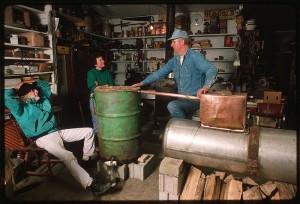By Richard Thomas
In Portugal, it often seems like half the people with even so much as one back acre of land don’t use it to put in a swimming pool or plant a flower garden, but instead plant a vineyard. Those who do almost invariably make their own wine, and some of them take it a step further. Using stills, some of them so small they run from kitchen stove burners, they make aguardente, the Lusitanian grappa.
Home distilling is illegal in Portugal, of course, just as it is virtually everywhere except New Zealand. Despite this, the practice is widespread, and it seems the police have better things to do, so long as the homemade hooch doesn’t go retail.
That is very far from the reality in the United States. There Federal law is crystal clear: without a license, you can’t distill alcohol. Period. Each offense relating to the illegal production of distilled spirits is liable to a fine of up to $10,000 and imprisonment for up to five years, and that isn’t even getting into illicit sales. Home distillation of spirits is legal to varying degrees in eight states—Alaska, Arizona, Maine, Massachusetts, Michigan, Missouri, Ohio and Rhode Island—but Federal law still applies there. Everywhere else, you not only need to worry about Federal law enforcement, but state law enforcement as well.
Going Semi-Legit?
Note that it isn’t illegal to own a still under Federal law. Distillation equipment has many uses aside from making booze, and most of them are perfectly legal. This is how the many small copperworks shops that have mushroomed up across America can hawk stills sized for garage or even stove top use, many too small for even the tiniest of micro-distillers. Through that loophole, many illicit distillers acquire their equipment.
And despite the illegality, distilling whiskey (and gin, vodka, rum, etc.) has become a niche hobby. Several micro-distillery owners I know candidly admit they cut their teeth as spirits-making hobbyists. Within the distilling hobby community, getting a Federal Fuel Alcohol Permit is often seen as a wise precaution. The skuttlebutt is that no one has ever been checked up on by the Feds to make sure their still was being used solely to make fuel alcohol, and often the difference between what you would put in your weed-whacker and what you would drink could be just a matter of how strong the alcohol content is.
With the U.S. government squared away, the remaining issue is state law. As previously noted, in several states making homemade spiritous liquors is A-OK, but others require you to have a permit just to own the still, and are thus more restrictive than Federal law on the issue. North Carolina and Texas are examples. You might be able to get a state-level fuel permit, or you might not.
Even after taking the precaution of pretending to be a fuel alcohol-maker, it’s all merely a ruse, and making distilled spirits for consumption is still illegal. Having a good cover doesn’t change that. As someone who follows news stories about moonshine closely, I can tell you the idea that “so long as you don’t sell your liquor, you’ll be fine” is a false one. A couple of times a year, I see stories about a student or suburbanite who was arrested for making homemade spirits, usually ratted out by their neighbors. I can’t tell you if they were all licensed fuel alcohol makers or not, but what they were not doing was running a commercial operation. The distinction didn’t make the police look the other way, as it so often does here in Portugal.
 The Whiskey Reviewer A World of Whiskey, Poured Every Weekday
The Whiskey Reviewer A World of Whiskey, Poured Every Weekday



This 100%.
The heads contain copious amounts of methanol. Throw out the first 50-100 100mL depending on batch size. Furthermore, the tails contain acetone and aldehydes – good for cleaning, not good for drinking.
This is still in 101 type shit – know what you are doing, keep it safe.
Pretty much every home-distilling site says home any distilling whatsoever is illegal without a federal permit.
But when I look at the U.S. Code, I.e. Title 27, the only stated requirement for a permit specifies commercial or industrial use. (See https://www.ttb.gov/distilled-spirits/permits).
From the plain text, it seems pretty clear that the law does not contemplate licensure of home distillation not intended for commerce. This is, by the way, the same as the laws concerning firearms manufacture; it is completely legal to make your own firearm.
Basically federal permits and licenses are based on the Commerce Claue. No commerce, no federal power to regulate.